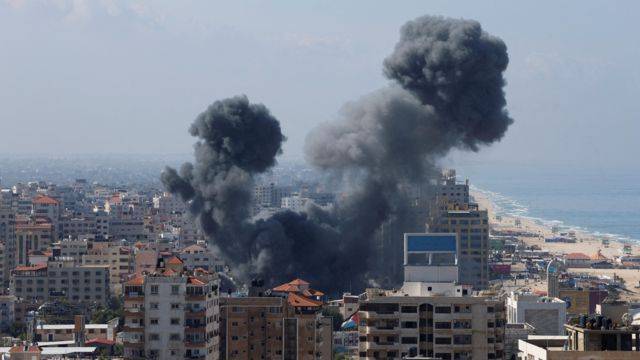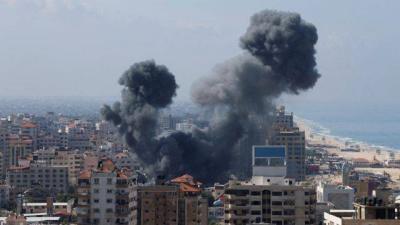Israel continued its bombing of the Gaza Strip with airstrikes on Monday morning, while Israeli aircraft launched attacks on southern Lebanon overnight as Prime Minister Benjamin Netanyahu held a meeting with senior military leaders and the War Cabinet to assess the escalating conflict. Palestinian media reported that the Israeli attacks focused on central and northern Gaza. Media reports indicated that an air raid on a house near the Jabalia refugee camp in northern Gaza resulted in the deaths of several Palestinians and injuries to others. Gaza’s health authorities reported that at least 4,600 people have died as a result of the ongoing Israeli bombardment that began two weeks ago following an attack by the Islamic Resistance Movement (Hamas) on Israeli towns on October 7, which killed 1,400 people and led to the abduction of 212 individuals taken to Gaza. Hamas stated in a statement that the movement's political bureau head, Ismail Haniyeh, received a phone call from Iranian Foreign Minister Hossein Amir Abdollahian during which they discussed how to use all means to stop Israel’s "brutal crimes" in the Strip.
Israel is mobilizing tanks and troops near the border fence around Gaza in preparation for a planned ground invasion aimed at eliminating Hamas, following several inconclusive wars since the movement came to power in the Strip in 2007 after Israel ended a 38-year occupation of Gaza. Concerns have increased that the war between Israel and Hamas could escalate into a wider conflict in the Middle East, with Washington warning of a significant danger to U.S. interests in the region and announcing the deployment of advanced air defense systems. U.S. Defense Secretary Lloyd Austin told ABC's "This Week" on Sunday, "We are concerned about the potential for escalation. In fact, we see a possibility for significant escalation in the attacks on our forces and citizens throughout the region."
Chinese state media reported today that China's special envoy to the Middle East, Zhai Jun, who will visit the region, warned that the potential for large-scale ground attacks is increasing and that the widening scope of conflicts in the region is "worrisome." Iranian security officials told Reuters that Iran's strategy involves its proxies in the Middle East conducting limited attacks on Israeli and U.S. targets while avoiding significant escalations that could pull Tehran into the conflict.
In neighboring Syria, state media reported that an Israeli missile attack targeted Damascus and Aleppo international airports yesterday, resulting in at least two workers being killed and both airports going out of operation. Iran, a main supporter of Hamas in the region, maintains a military presence in Syria.
On Israel’s northern border with Lebanon, clashes erupted between the Iran-backed "Hezbollah" group and Israeli forces in support of Hamas in the largest escalation of violence across the border since the Israel-Hezbollah war in 2006. The Israeli army stated that its aircraft targeted two Hezbollah cells in Lebanon early Monday that were planning to launch anti-tank missiles and shells toward Israel. The army also reported hitting other Hezbollah targets, including a compound and observation point. Hezbollah noted today that one of its fighters was killed but did not provide details.
As the pace of violence increases along its heavily fortified borders, Israel added 14 residential gatherings in its northern regions near Lebanon and Syria to its evacuation plan.
### More Aid Arriving in Gaza
Palestinian Prime Minister Mohammad Shtayyeh called on the international community to form a "united front" to stop Israel's attacks in the Gaza Strip and allow the much-needed flow of aid, which began entering just on Saturday. The White House stated that a second convoy consisting of 14 aid trucks entered the besieged Gaza Strip from the Rafah crossing on Sunday. U.S. President Joe Biden and Netanyahu confirmed in a phone call that "there will now be a continuation of the flow of this vital aid to Gaza."
The United Nations Office for the Coordination of Humanitarian Affairs reported that the volume of goods that entered is only about four percent of the daily average of imports that used to enter the Strip before the crisis and represents only a small fraction of what is needed as food, water, medicine, and fuel supplies run low. Biden has intensified diplomatic efforts, contacting Netanyahu and Pope Francis, and holding a remote meeting with leaders from Canada, France, Britain, Germany, and Italy regarding aid delivery to Gaza and preventing the conflict from spreading.
In a joint statement, the leaders expressed their support for Israel’s right to defend itself while urging it to adhere to international humanitarian law, including protecting civilians. Netanyahu's office indicated that he also had phone conversations with the leaders of France, Spain, and the Netherlands late Sunday. Dutch Prime Minister Mark Rutte is scheduled to visit Israel today, and the Élysée Palace announced that French President Macron will visit Israel on Tuesday.




